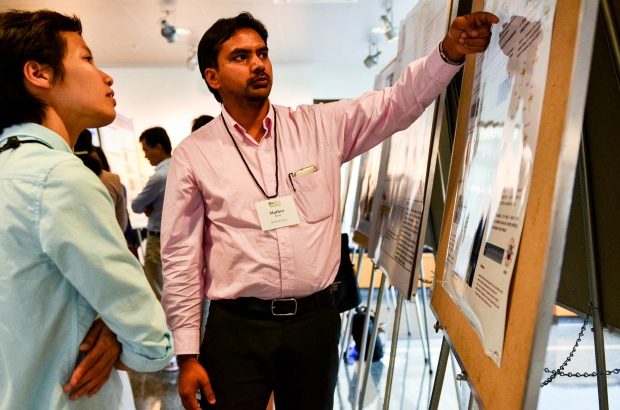I teach Physics and sometimes I wonder when will my students use their newly acquired knowledge of plant cells or exit velocity? Well honestly, most of them probably won’t. We’re not all destined for science. But we all use the same skills that are key for conducting good science.
Scientists in the 21st century are intensively curious, avid readers, prolific writers, effective communicators and extensive networkers. Most people, students included, would benefit from learning any number of these key skills regardless of their chosen profession. Here is my big list of the science skills that both scientists and non-scientists alike will need to be a successful member of our society.

Image credit: CAFNR
Inquiring minds
Scientists are among the most curious people in society. They have to be constantly questioning, investigating and explaining mysteries. Scientists are in charge of covering all of our “what if” and “why does” questions. They have to push conventions, uncover assumptions and think outside the box as a job. It’s not all fifty pages of intense applied calculus as its reputation might lead people to believe.
Gathering information
Once armed with a good question, scientists will then test their ideas with experimentation or research. They are responsible for the reliability of the information that they collect. Any errors in the data could lead to massive misconceptions like the iron in spinach mistake that still misleads people.
Again, what non-scientific individual would not benefit from knowing how to access reliable information to inform their opinions and decisions? It’s important as a global citizen to be able to make informed decisions as consumers and members of a democracy. Many people currently do not inform themselves with accurate information. We’ve seen this in many public debates and problems in forums like the climate change debate where people rely on the information of organisations with agendas to inform them of their best interests. However, society would have a much more positive impact on policy and consumerism if more people took the initiative to gather reliable data before making decisions or forming opinions.
Processing data
By gathering information, scientists often gather excessive amounts of data. A matrix of numbers or bookshelf of highlighted research papers does not communicate much meaningful knowledge even to a scientist. We have to process the data gathered to account for errors and identify patterns before we can be sure of the meaning behind the data.
The ability to sift through information to find the relevant points is a universally beneficial skill. Information gathering can be a bit like a fishing expedition that generates more data than needed to answer your driving question. It’s important to be able to sift out the unrelated information to focus on the data that will help inform your decision or strengthen your argument. Science can teach you!
Communicating
All right, the numbers are crunched, the articles have been categorised, what now? Once the data has been gathered and analysed scientist must determine the most effective way of communicating their findings to their colleagues and the less-scientifically inclined. Scientists communicate in a whole myriad of ways both formal and informal. They write official research papers, articles for magazines and blog posts. Scientists also talk about their findings with colleagues at conferences, at parties, on YouTube and television.
Effective communication is also a universal skill as it is the way that we connect to and relate to others in our society. I think it goes without saying how effective write and aural communication would help people in almost every occupation and their personal lives.
Collaborating
Scientists don’t live in a vacuum. They feed off each other’s ideas, questions and challenges. Scientists are fantastic networkers despite their socially awkward reputation. They catch up at functions and parties to discuss ideas and argue about concepts.
Collaborating can also be beneficial to the non-scientist. By collaborating we reduce the need to reinvent the wheel over and over again, saving valuable time. In some professions it’s not possible to collaborate about the content but even then colleagues or friends can help with general advice about work or personal life. The ability to communicate on this level is very valuable for anyone.
Skills for the classroom
- Asking good questions. – The application of an inquiring mind
- Getting good information. – Gathering reliable and comprehendible data
- Organizing information. – Getting rid of any information that doesn’t help answer your driving question
- Communicating your findings. – Working out how to explain your new knowledge or informed decision so that others can benefit from your findings.
- – Sharing your experience with others and taking criticism or suggestions for improvement.
Science taught this way (skills based) is often referred to as a practice-orientated curriculum. It could be the key to maintaining student engagement throughout the science curriculum.
“A practice-oriented curriculum might offer all students hope that they could find their own way of successfully doing and enjoying science, rather than having to conform to “the” singular and unrealistic scientific method.” Scientific practice and science education – C. Mody